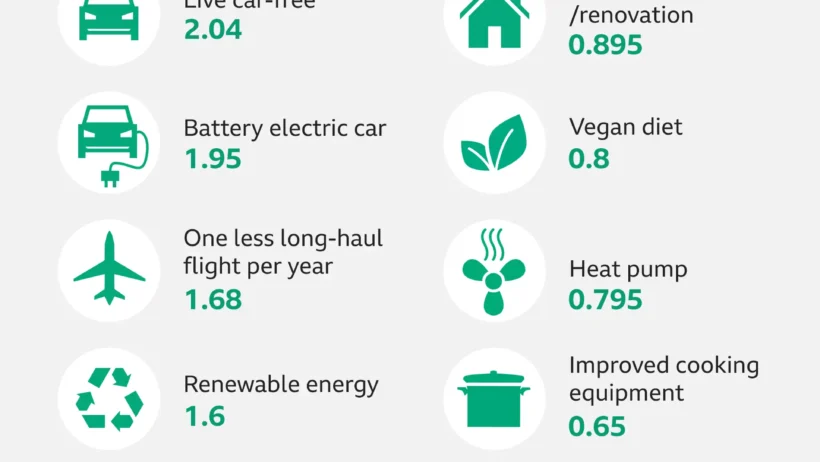Climate change is an existential crisis that impinges on every facet of our lives. Addressing this monumental issue requires concerted action from individuals, communities, corporations, and governments. The choices we make today can pave the way for a sustainable future. This article delves into multifaceted ways we can help reduce climate change, emphasizing practical steps that everyone can take to contribute meaningfully.
Fostering Energy Efficiency and Renewable Energy
Energy consumption is a primary driver of greenhouse gas emissions. One effective strategy for mitigating climate change is to enhance energy efficiency in our homes and workplaces. Simple measures can have profound effects. For instance, using LED light bulbs, which consume significantly less energy than traditional incandescent bulbs, can reduce electricity demand substantially. Additionally, employing energy-efficient appliances labeled with Energy Star certifications ensures responsible usage of power.
Moreover, transitioning to renewable energy sources is imperative. Solar panels and wind turbines reduce reliance on fossil fuels and minimize carbon footprints. Homeowners can consider installing solar panels to harness sunlight, which can offset hefty energy bills while contributing to cleaner air. Communities can advocate for local government incentives to bolster renewable energy initiatives, encouraging larger scale shifts towards wind and solar energy. By embracing these sustainable alternatives, we not only combat climate change but also foster resilience within our energy infrastructures.
Revolutionizing Transportation Choices
Transportation is another significant contributor to carbon emissions. Rethinking how we move is crucial in this fight. Opting for public transit, carpooling, or cycling can greatly diminish our individual carbon footprints. Urban planning that prioritizes public transport access reduces the appeal of car dependence. Furthermore, electric vehicles (EVs) represent a transformative avenue to lower emissions. As the technology matures and battery costs decline, EVs are becoming increasingly accessible to the everyday consumer.
For those who still rely on traditional vehicles, maintaining proper tire pressure, conducting regular tune-ups, and observing speed limits can enhance fuel efficiency. As citizens, pushing for better public transport systems and advocating for comprehensive cycling infrastructure can redefine our approach to mobility. This shift can generate a collective impact that reverberates through future generations.
Practicing Sustainable Eating Habits
The food we consume is intrinsically linked to climate change. Our agricultural practices, particularly those geared toward raising livestock, result in extensive carbon emissions. Shifting to a plant-based diet can significantly lessen this burden. Incorporating more fruits, vegetables, grains, and legumes into our meals is a powerful method to advocate for environmental sustainability. Even small changes, such as participating in “Meatless Mondays,” can lead to substantial reductions in greenhouse gas emissions.
Local and seasonal consumption not only fosters community resilience but also cuts down the carbon footprint associated with food transport. Supporting local farmers’ markets or community-supported agriculture (CSA) programs can ensure fresher produce while engendering a sense of stewardship toward the environment. This awareness of where our food comes from encourages conscientious choices regarding food waste; composting organic materials and properly disposing of waste can further mitigate our ecological impact.
Advocating for Policy and Community Action
While individual actions are vital, systemic change is paramount in the fight against climate change. Getting involved with environmental advocacy groups or joining local organizations dedicated to sustainability can amplify our impact. Governments heavily influence environmental policy, so contacting local representatives to express support for climate-friendly initiatives is crucial. This advocacy can persuade those in power to prioritize renewable energy investments, stringent emissions regulations, and preservation of existing natural resources.
Community inertia can lead to significant changes, mobilizing people to collectively work toward sustainability. Organizing community clean-up events, tree planting activities, or sustainability workshops can cultivate awareness and foster collaboration among community members. Furthermore, schools and educational institutions can incorporate sustainability education into their curricula, nurturing an environmentally conscious generation. By planting the seeds of ecological awareness within communities, we can create a robust culture dedicated to combating climate change.
Embracing Minimalism and Conscious Consumerism
In an era of rampant consumerism, adopting a minimalist mindset can play a pivotal role in reducing our ecological footprints. Evaluating our purchasing habits and opting for quality over quantity can mitigate the waste generated from fast fashion and disposable products. By choosing sustainable brands that prioritize ethical practices and environmentally friendly materials, consumers can drive demand for more responsible production methodologies.
Second-hand shopping is another excellent avenue to reduce waste and promote sustainability. Thrift stores and online platforms offer ways to repurpose and recycle existing materials, diminishing the strain on our planet’s resources. Embracing a lifestyle that values simplicity and sustainability empowers individuals to cultivate mindfulness about their consumption decisions, ultimately leading to a more eco-conscious society.
Creating Lasting Change Through Collective Efforts
Climate change poses an intricate and widespread challenge, but each of us has a role to play in crafting solutions. By embracing energy-efficient technologies, prioritizing sustainable transportation, altering dietary habits, advocating for policy changes, and committing to minimalism, we can collectively create a more sustainable world. The synergy of our actions magnifies their impact, underscoring that change is possible, and the future can be greener. Together, let us embark on this journey towards environmental stewardship, ensuring that our planet remains habitable for generations to come.








